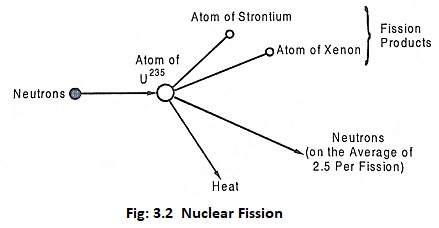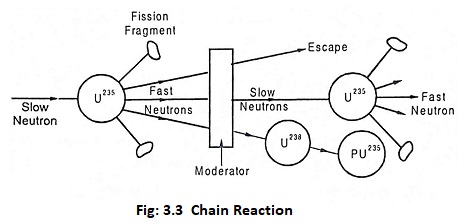Nuclear Fission and Nuclear chain reaction:
Uranium exists in different isotopes of U238, U234 , and U235. Out of these, U235 is the most unstable. When unstable heavy nucleus is bombarded with high energy neutrons, it splits up roughly into two equal fragments and about 2.5 neutrons are released and a large amount of energy is produced (nearly 200 million electron volts). This process is called Nuclear fission.
Also, the nuclear fission is followed by the emission of several high energy neutrons per neutron bombarded. This is the essential condition for self-sustaining the chain reaction. Thus the neutrons produced by nuclear fission are very fast moving neutrons and can be made to bombard other nuclei of U235 to enable a chain reaction. When a large number of fission occurs, enormous amount of heat is produced. The chain reaction is shown in Fig. 3.3.
Out of 2.5 neutrons released is fission of each nuclei of U235, one neutron is used to sustain the chain reaction, about 0.9 neutron is captured by U238 which gets converted into fissionable material, Pu239. And about 0.6 neutron is partly absorbed by control rod material, coolant moderator, and partly escape from the reactor.
If U235 (or) U238 is used in the reactor core, it produces fissionable material Pu239
i.e. U235 + U238 + neutron = Pu239.
Similarly, if thorium is used in the reactor core, it produces fissionable material U233.
i.e. Th232 + neutron = U233
Thus, Pu239 and U233 are fissionable materials and they can be used as nuclear fuel and are known as secondary fuel, and U235 and Th232 are known as primary fuels.
The chain reaction produces constant rate of heat energy and it may continue only if the neutron liberated by fission, balance the disposal of neutron by different ways as given below.
- Escape of neutrons from the fissionable material.
- Fission captured by U235, U238 and Pu239 and U233.
- Non-fission captured by moderator, control rods fission fragments and by impurities.
When the neutrons produced in the chain reaction are less than the neutron disposed off in different ways, then the chain reaction will stop.

